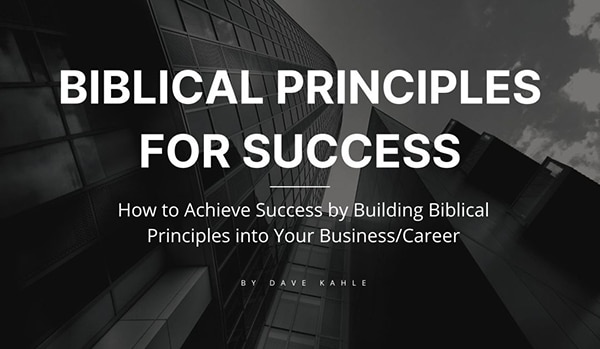Biblical Principles for Success by Dave Kahle
November 9, 2023
One of the principles that I have discovered in my 35 years as a consultant and sales guru is this: Biblical business principles are also those principles that enable a company to achieve more of its potential. In other words, you can take the Biblical sourcing away from a business principle, and the principle still works.
I’ve stumbled across this truth as it specifically relates to B2B salespeople. Assemble a system and a set of practices that enable a salesperson to leap to the top of his/her profession, and, coincidentally, those principles arrived at through a study of the best practices of successful salespeople are the very same principles discerned through a study of the Bible.
As a consultant, I’ve discovered the same truth applied to businesses and professional careers. Adhere to certain Biblical principles, whether or not you know they are Biblical, and your career will blossom, and your business will reach more of it’s potential. You don’t need to be a Bible student to discover the principles upon which you can build a successful career, you just need to study the best practices of the best in your business and the two will coincide.
In an earlier article, I unpacked one such principle: “Do unto others as you would have them do unto you.” Biblically, Jesus said this in Matthew 7:12. Practically, it’s incredibly good advice upon which you can build a personal character and a corporate culture.
In this article, I’m going to add another Biblical principle that coincides with best business practices: Do everything with integrity. Build integrity into your personal character and your corporate culture.
Let’s begin with a definition: According to Dictionary.com, integrity is “adherence to moral or ethical principles.” Biblically, the New Testament Greek word which is translated as Integrity in English means “Honesty and adherence to a pattern of good works.” It is one of the core Christian ……………………….
So, if you build integrity into your business character and your corporate culture, you’ll be manifesting what is both a Biblical principle as well as a best business practice. Simply put, operating with integrity is good business.
Here’s why: Integrity leads to trust. Trust saves time and is necessary for any ongoing customer or employee relationship. It’s hard to develop a core of loyal customers, or employees if they don’t trust you.
Honesty is a powerful sales strategy that is probably more important today than ever before.
It works like this. If you have integrity, you save your customer time. In today’s frenzied world, time is more precious than money. If your customers cannot believe you, then they must spend hours, days or weeks of precious time confirming the representations you have made. If, however, they can believe you, then they don’t feel the need to check for the veracity of every fact or statement.
Here’s an illustration. A few years ago, we attempted to purchase a condominium. The condo was in a resort location and had been used as a rental unit. So, it came fully furnished, down to the silverware and cooking utensils. We thought it was a good value, a wise investment, and offered the owner exactly his asking price. Shortly thereafter, word came from the real estate agent that the owner, on receiving our full price offer, had increased his price.
The owner may have been looking at his action as a slick negotiating ploy. We saw it as a lack of integrity. If we couldn’t believe his stated price, then we couldn’t believe any of the representations he had made. We would be reduced to counting the number of knives and forks instead of believing the inventory sheet provided for us. We didn’t want to waste the time checking out every aspect of the deal. If we couldn’t trust some of the representations by the owner, then we couldn’t trust any. And, if we couldn’t trust any, it wasn’t worth it to us to take the risk in dealing with him. We walked away from the deal.
We saw the owner’s lack of integrity as causing us to invest a great deal of time to assure ourselves that the risk was worth the money.
The same is true of your customers. The more your customer trusts you, the less risk your customer feels in dealing with you, and the less time necessary to invest in understanding the product, service or program you are offering. From the customer’s perspective, it’s easier and less risky to deal with someone you trust than with someone you don’t trust.
And that can translate directly into dollars. I’m always willing to pay more for something if I can buy it with less risk. In other words, if I can buy it from a company or person I can trust. On the other hand, I’d rather not buy something at all if I have suspicious feelings about the vendor.
Here’s another example. A few years ago, I grew jealous of my neighbor’s lawn. His was far greener, thicker and fuller than my lawn. It was because he had a lawn care service fertilize his lawn several times each year. I determined to do the same thing. So I obtained the name and phone number of the company he used, formed an idea of what the service would cost me, and decided to do business with that company.
I called the company, ready to buy the service. When I inquired about the types of service available, the salesperson indicated that there were several options available. Now, I’m a visually oriented person, and I like to make decisions based on what I read, not on what I hear. So, I said, “OK, why not come out and do the first application, and leave me a brochure so that I can review my options, and then I’ll make a decision.” The salesperson agreed.
We then reviewed the details of my location, and the approximate date for the first fertilizer application. It was a deal. The salesperson then repeated our agreement, saying, “OK, we’ll be out to do the first application and we’ll leave a brochure, and then you can cancel at any time with 30 days’ notice.”
“What?” I said.
He repeated his comment. “Wait a minute,” I said. “I only agreed to one application. I’m not committing to any ongoing contract until I check out all the options.”
“But that’s not how we do it,” the salesperson stammered.
“No,” I said.
“But, But…” more stammers.
“NO.” I said again. “Forget it. Cancel me.”
What happened? Here I was, as good a prospect as there ever was. I was ready to purchase, having decided to use this company, even calling them to make the purchase. Yet something in what the salesperson said raised a red flag in my mind, and made me doubt the integrity of the person, and by inference, the company. He had originally said that I would be billed for only one application, and then implied that I was committing to an ongoing program.
I viewed that as being deceitful, or at best manipulative. If I can’t trust them on that, on what can I trust them? There are lots of other lawn care companies, and the next one in the yellow pages got my business.
Which illustrates another aspect of integrity. There can be no compromises with integrity. You can’t have integrity on this thing, but not on that, and expect to build trust. It is an all or nothing issue. Integrity must extend down to the smallest details. My lawn care story illustrated that principle. The company may have prided themselves on their integrity, but a few words from a salesperson evoked my suspicions. If I can’t trust them on this, how can I trust them on something else?
Life’s too short, and business is too busy to deal with people you can’t trust. And trust is the natural outcome of integrity.
Dave Kahle
The Kahle Way
sell better, manage better, lead better
(616) 451-9377
